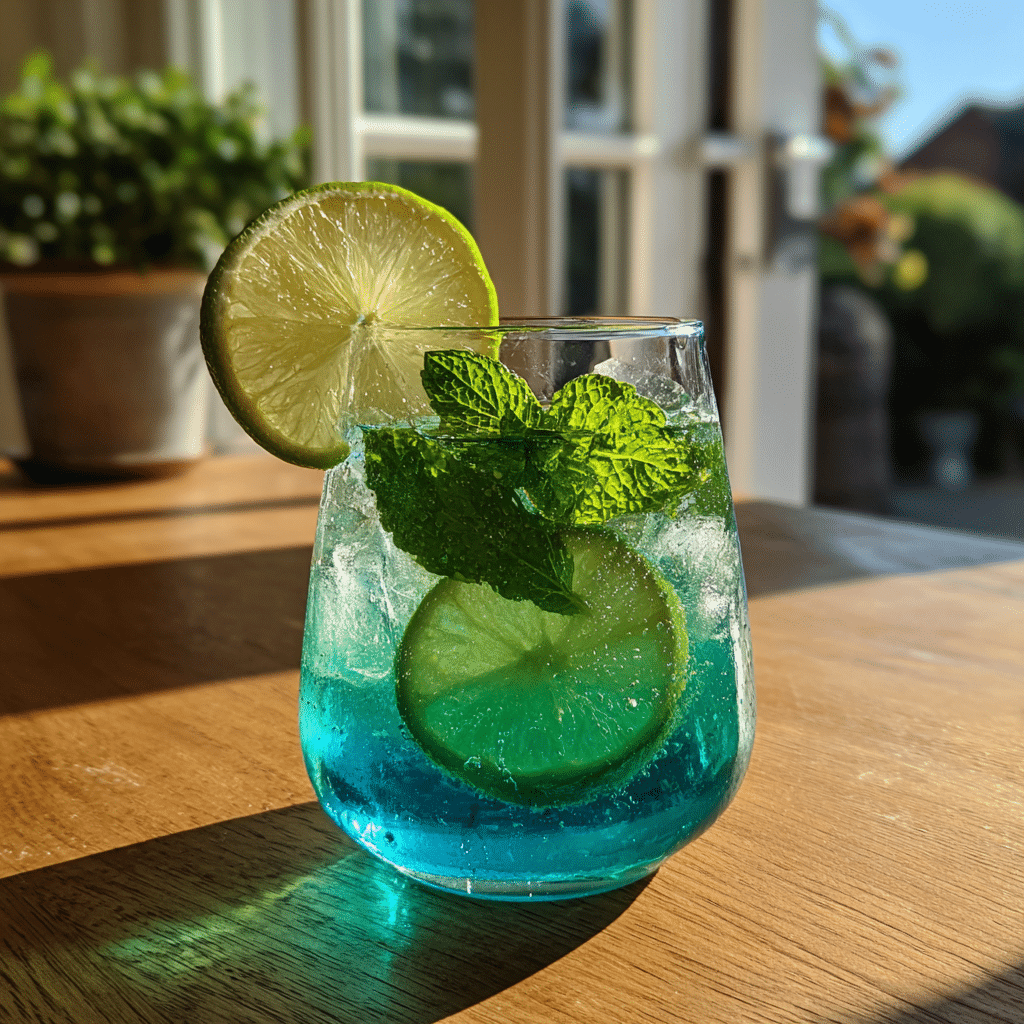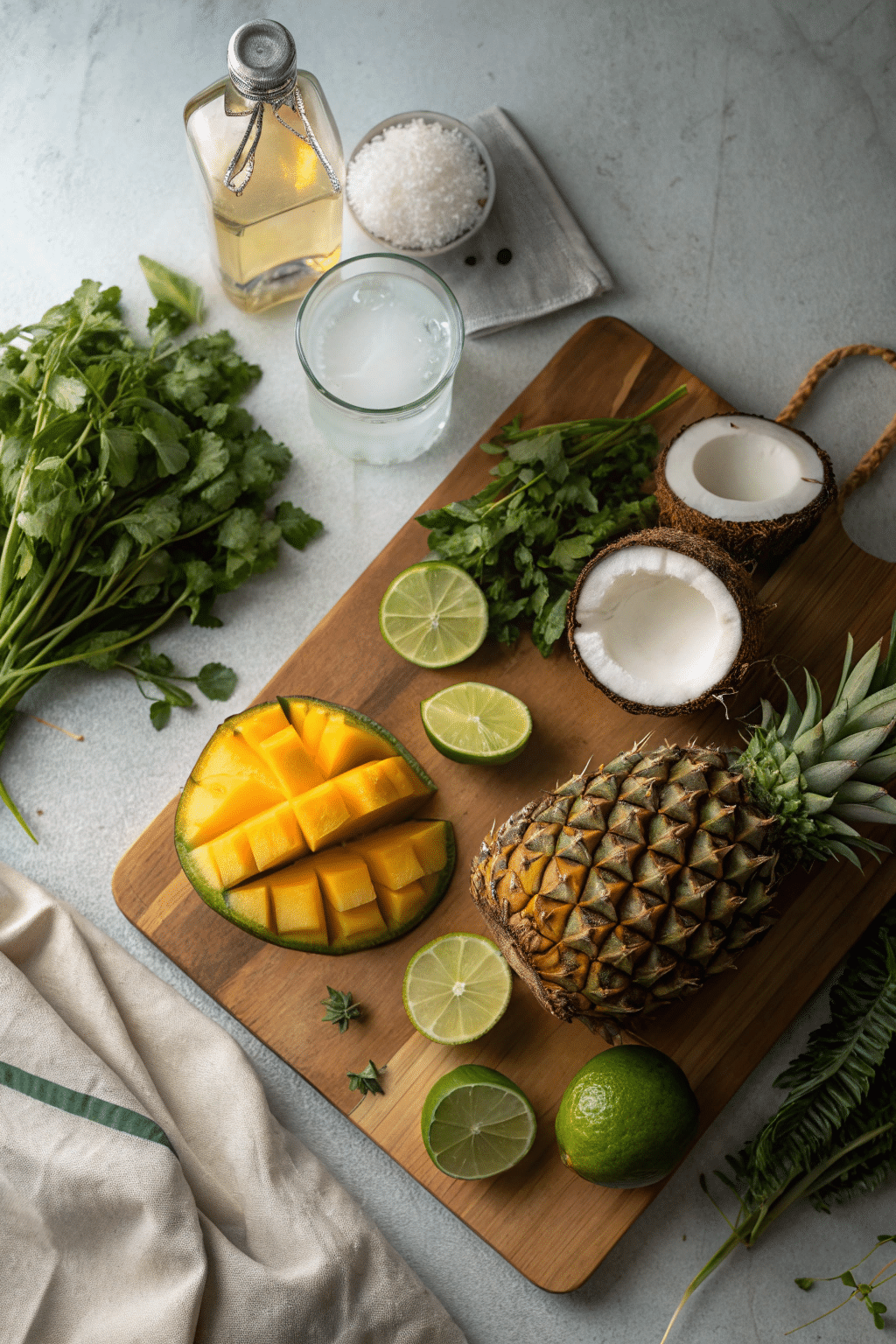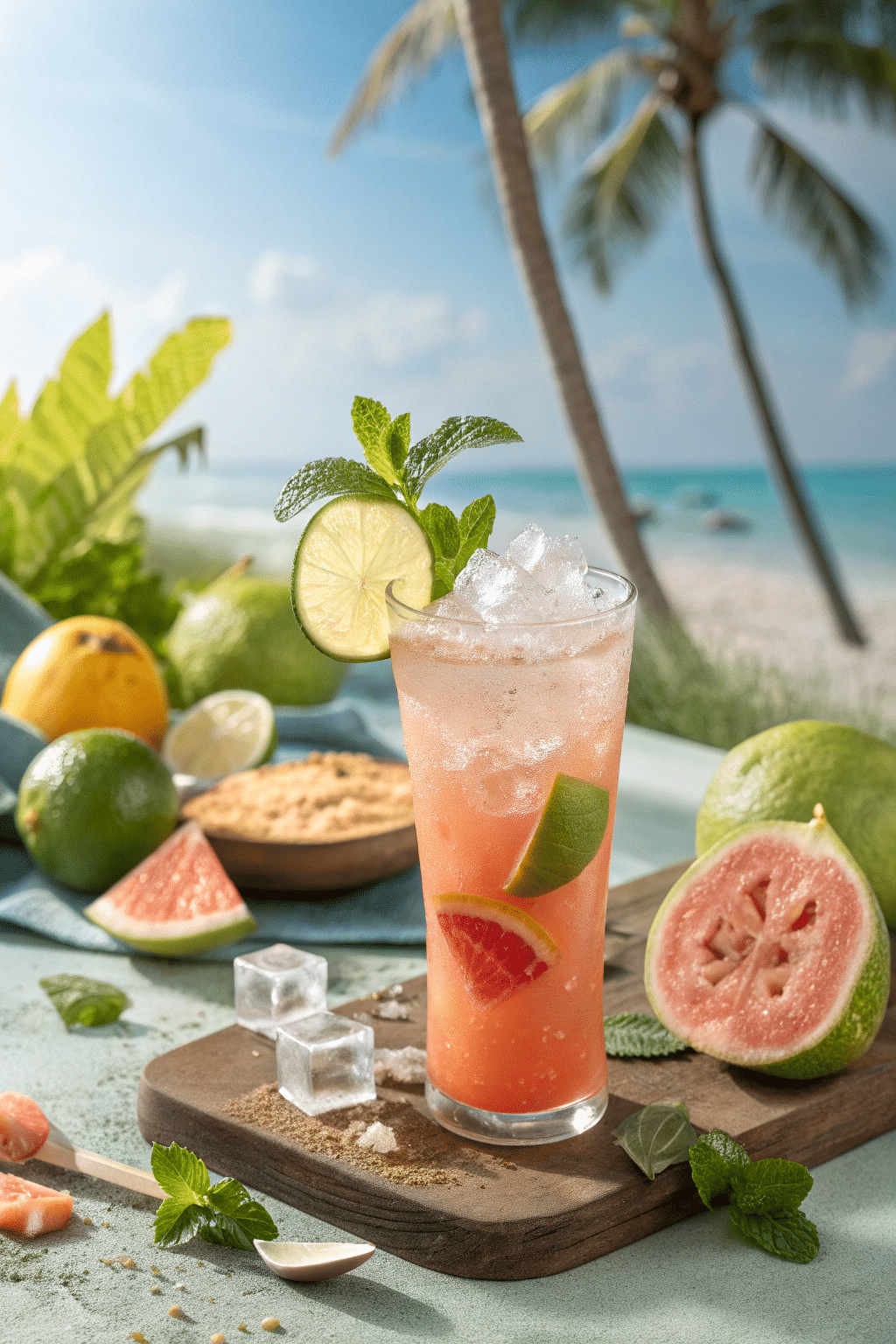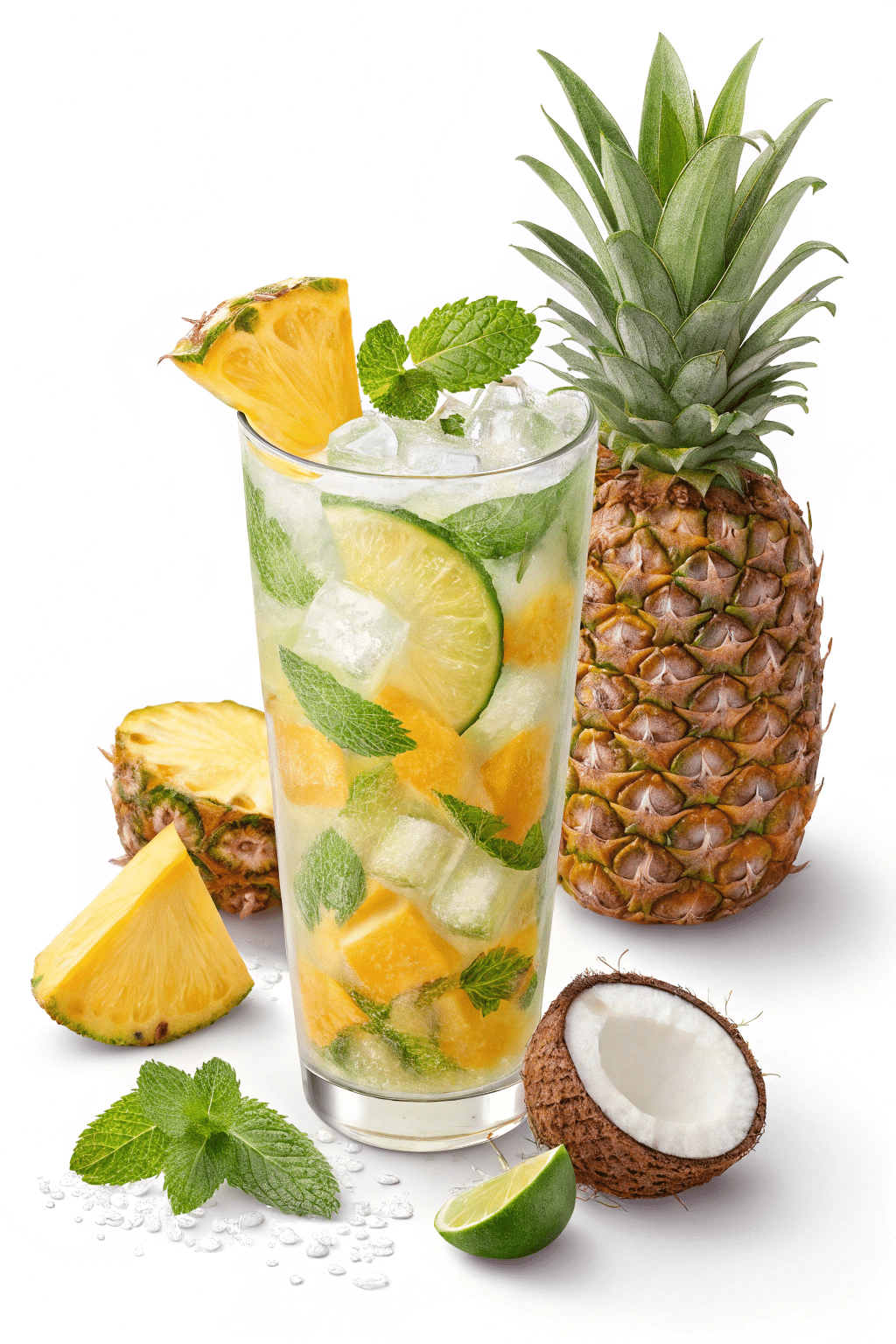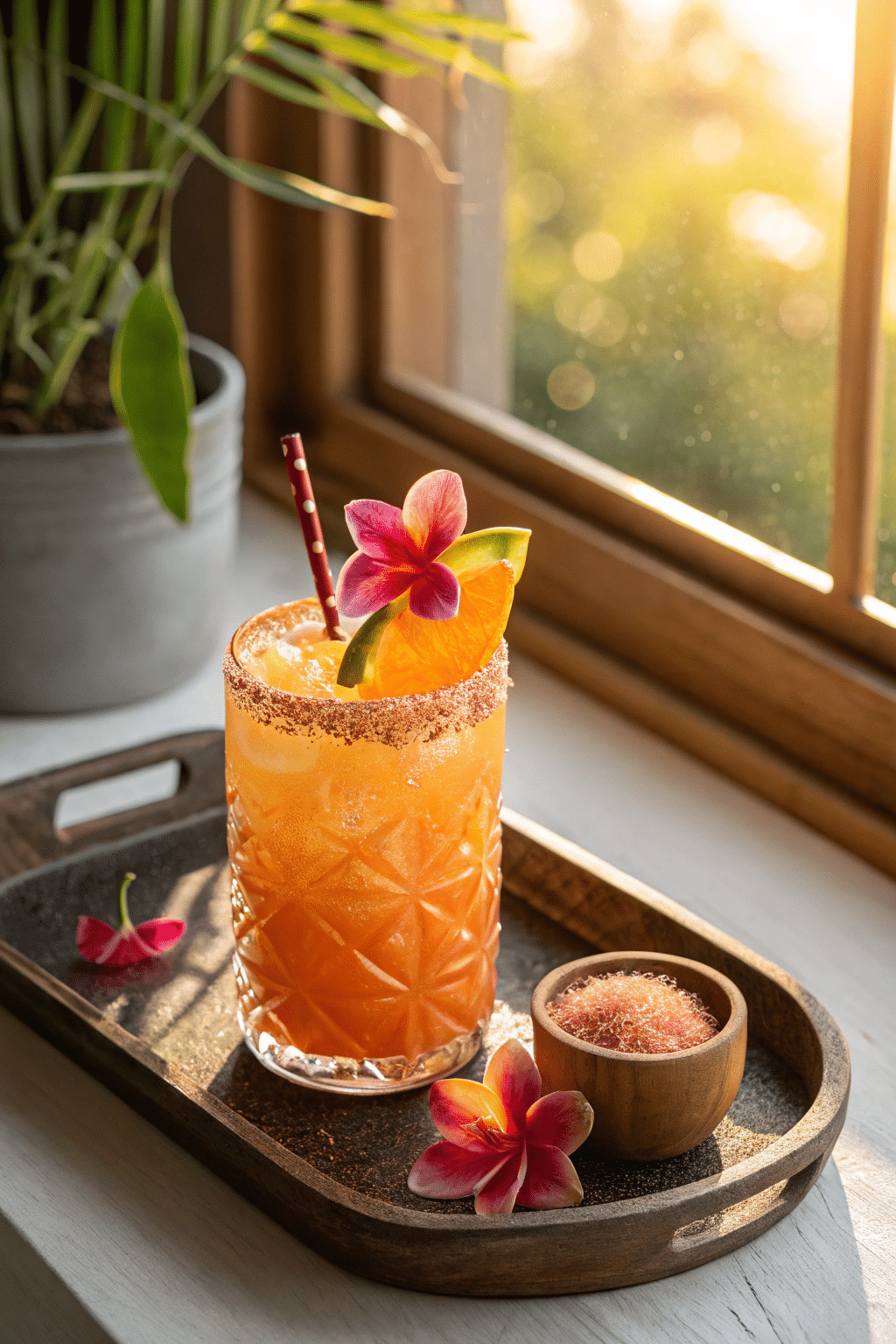Cutting sugar doesn’t mean cutting flavor. I’ve learned that firsthand while creating healthy & low-sugar tropical mocktail recipes for friends and clients who wanted that beachy vibe — without the blood sugar spike. Whether you’re on a wellness kick, cutting back for health, or just want to sip smarter, these mocktail ideas are packed with flavor, not fructose. In this guide, we’ll explore my favorite tricks for building a healthy & low-sugar tropical mocktail using real fruit, herbs, and gorgeous presentation — all without added syrups. You’ll walk away with drink ideas that hydrate, refresh, and honestly? Taste better than most cocktails I’ve had.
Table of Contents
Build the Best Healthy & Low-Sugar Tropical Mocktail with Fresh Fruit
Let Fruit Do the Sweet Talking
I still remember sipping a chilled guava-lime mocktail in Tulum. No syrup, no sugar — just ripe fruit, fresh lime, and sparkling water. That’s the moment I realized how good a healthy & low-sugar tropical mocktail could taste.
Skip the sugary mixers. Use naturally sweet tropical fruits like mango, pineapple, and watermelon. These deliver lush flavor without a single spoonful of sugar.
Try the Frozen Mango Daiquiri Mocktail or the exotic Dragon Fruit Mocktail — both are perfect for sweet tooths looking for something fresh, not fake.
Hydrating Citrus Boosts in Every Healthy & Low-Sugar Tropical Mocktail
Citrus isn’t just a garnish — it’s a hero. It balances sweet fruits, adds zip, and turns your healthy & low-sugar tropical mocktail into something truly layered.
Use lime, lemon, or orange juice with sparkling water, cucumber juice, or coconut water. Pro tip: freeze fresh-squeezed citrus with herbs in ice cubes for a stunning, slow-releasing flavor burst.
Need ideas? The Berry Bliss Mocktail uses lemon and herbs to feel indulgent, while the Blood Orange Mocktail Spritzer gives citrus fans the punch they crave.
Sweeten Your Healthy & Low-Sugar Tropical Mocktail the Smart Way
Smarter Sweeteners for a Healthy & Low-Sugar Tropical Mocktail
When I first started crafting healthy & low-sugar tropical mocktails, I assumed I’d need at least a touch of syrup or honey. Turns out, I was wrong. Most of the time, when your base is made from ripe mango, pineapple, or guava — you can skip sweeteners entirely. But when you do want a touch of extra sweetness, reach for natural options like raw honey, a dash of agave, or monk fruit. These won’t spike your blood sugar and blend beautifully into tropical drinks.
Looking for a smart-sweet sip? Try our Virgin Mango Margarita — it balances agave with bright citrus, or explore the no-sugar options in our Sugar-Free Tropical Mocktails roundup.
Spices & Herbs that Elevate Your Healthy & Low-Sugar Tropical Mocktail
Here’s the trick I teach all my clients: when sugar is off the table, layers of flavor become your best friend. A pinch of cinnamon or ginger, fresh mint or basil, or even a sliver of chili — these instantly deepen a drink and trick your palate into feeling more satisfied.
My personal favorite? Muddling Thai basil with watermelon and lime. The result is herbaceous, tropical, and totally refreshing. For an herbal-citrus combo, try our Rosemary Paloma Mocktail or the Citrus Ginger Mocktail — both are flavor-packed and sugar-free.
Boost Your Healthy & Low-Sugar Tropical Mocktail with Hydrating Ingredients
Hydrating Bases for a Healthy & Low-Sugar Tropical Mocktail
| Hydration Base | Flavor Profile | Natural Benefits | Best Pairings |
|---|---|---|---|
| Coconut Water | Light, nutty, tropical | Electrolytes, potassium, hydration | Pineapple, lime, mint |
| Cucumber Juice | Crisp, fresh | Cooling, anti-inflammatory | Watermelon, lemon, basil |
| Aloe Vera Juice | Mild, slightly bitter | Gut-soothing, hydration | Grapefruit, ginger, agave |
| Herbal Green Tea | Earthy, smooth | Antioxidants, low caffeine | Mango, citrus, cardamom |
| Watermelon Juice | Juicy, sweet | Hydrating, vitamin C | Lime, mint, chili salt rim |
When I’m prepping for brunch or a wellness event, I often start with a base of coconut water and fresh-pressed citrus. It’s light, nutrient-rich, and surprisingly satisfying. Try something similar with our Hydrating Tropical Mocktails guide, or test out a light blend in our Tropical Punch Mocktail.
Layer Your Healthy & Low-Sugar Tropical Mocktail with Fruits & Electrolytes
Here’s where it gets fun. You can turn your healthy & low-sugar tropical mocktail into a wellness drink by layering fruits like kiwi, passion fruit, or dragon fruit — all loaded with vitamins and natural hydration. Add a dash of sea salt or a slice of citrus peel to help your body absorb those electrolytes even faster.
Some fitness pros I work with love a post-workout mocktail using watermelon juice, mint, and lime. For something more festive, the Sunrise Mocktail Recipe and the Tropical Fruit Juices page offer easy ways to mix wellness with flavor.
Dress Up Your Healthy & Low-Sugar Tropical Mocktail Like a Pro
Garnishing Your Healthy & Low-Sugar Tropical Mocktail with Style
Presentation changes everything — even the simplest healthy & low-sugar tropical mocktail feels luxurious with the right garnish. I’ve seen people sip coconut water out of a plain glass and barely notice it. Add a sprig of mint, a citrus twist, or a dehydrated pineapple slice? Suddenly it’s spa-day-worthy.
Try playing with texture: float edible flowers, rim your glass with chili salt or toasted coconut, or skewer fruit onto a bamboo pick for tropical flair. We’ve got tons of styling tricks in our Mocktail Garnishes article. Or see the effect for yourself in our layered Tropical Sunrise Mocktail — a beauty in every sense.
Choosing the Best Glass for Your Healthy & Low-Sugar Tropical Mocktail
Think of your glass like a stage. The right shape enhances aroma, shows off vibrant colors, and instantly upgrades the experience. I love using stemless wine glasses for mocktail mules, tall highball glasses for fizzy fruit blends, and tiki mugs for coconut-heavy recipes.
A little tip: chill your glass in the freezer before pouring to keep things icy and crisp without diluting flavor. If you’re serving a crowd, mason jars or clear acrylic cups let the colors shine. Get inspired with mocktails like the Bahama Mama Mocktail or our go-to Tropical Mocktails Guide — both are styled to impress.
Healthy & Low-Sugar Tropical Mocktail
1. What are some healthy & low sugar tropical mocktail recipes?
Some of the best recipes use fresh tropical fruits, no refined sugar, and hydration-boosting bases like coconut water. Try our Frozen Mango Daiquiri Mocktail, Virgin Mango Margarita, or our popular Tropical Punch Mocktail. They’re all naturally sweetened and easy to make.
2. Are healthy & low sugar tropical mocktails good for weight loss?
Absolutely. They help you cut calories without feeling deprived. By using fruits, herbs, and electrolyte-rich mixers, these drinks keep you satisfied and hydrated. Stick with recipes like the Hydrating Tropical Mocktails or those featured in our Sugar-Free Tropical Mocktails collection.
3. How do I make a low sugar mocktail taste good?
The key is layering flavor. Use ripe fruits for natural sweetness, then add citrus, herbs, and even a pinch of spice. Drinks like the Citrus Ginger Mocktail or Rosemary Paloma Mocktail prove you don’t need syrup to make a sip pop.
4. What makes a tropical mocktail recipe healthy?
A healthy tropical mocktail skips added sugar, uses fresh ingredients, and hydrates your body. Think coconut water instead of soda, real fruit over bottled juice, and garnishes like citrus zest or mint instead of candy rims.
Conclusion
Creating a healthy & low-sugar tropical mocktail isn’t just possible — it’s actually more fun. You get to play with color, texture, flavor, and freshness, all without worrying about sugar overload. From hydrating bases to fresh herbs and tropical fruits, every element brings something special. With the right ingredients and a little presentation magic, your mocktails won’t just be healthy — they’ll be the highlight of your day. Cheers to sipping clean, vibrant, and guilt-free!
According to the American Heart Association, cutting back on added sugars is a proven way to reduce inflammation and improve heart health.

